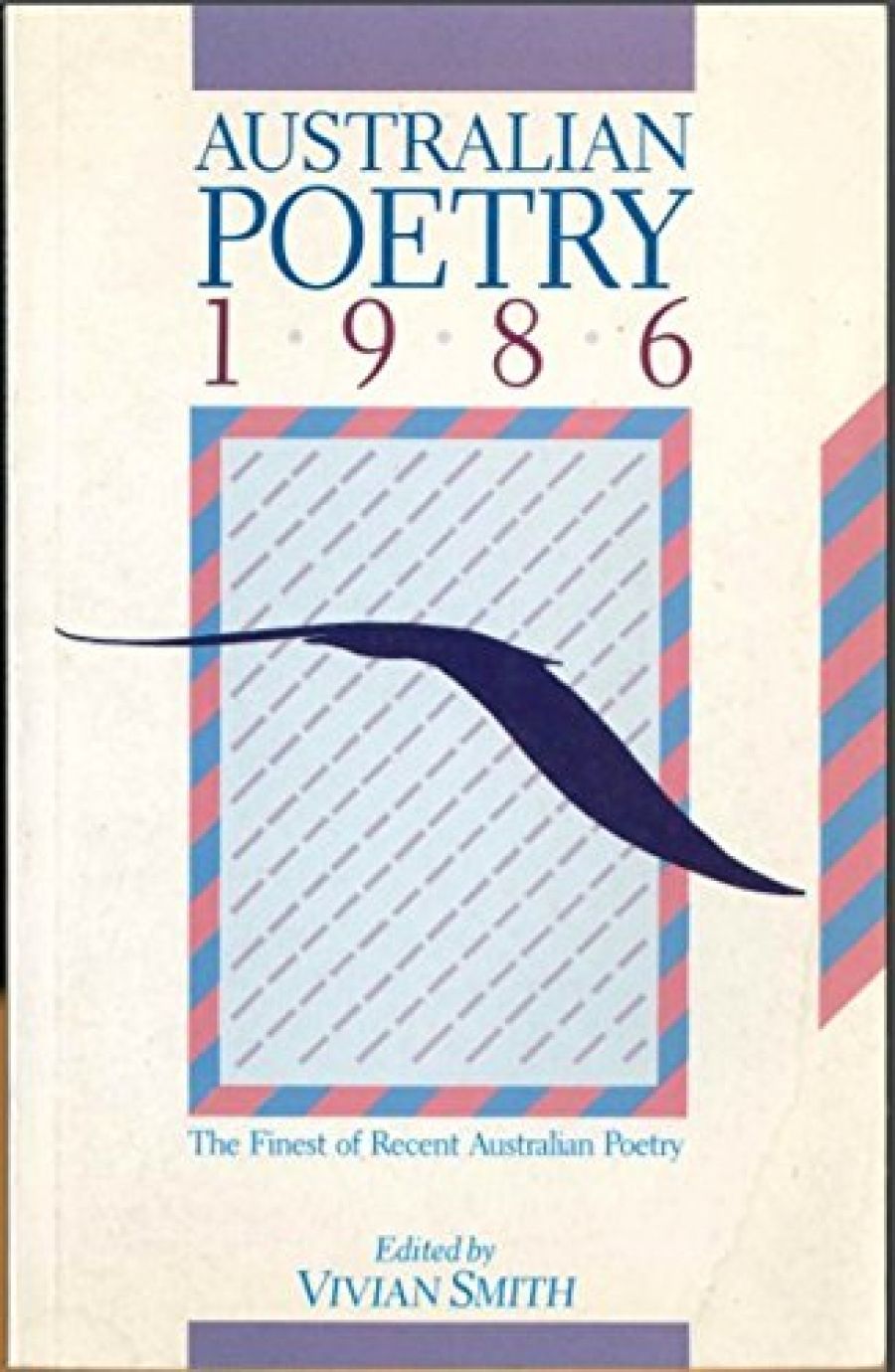
- Free Article: No
- Contents Category: Poetry
- Custom Article Title: Australian Poetry 1986
- Review Article: Yes
- Online Only: No
- Custom Highlight Text:
I have never met Vivian Smith but respect him awfully. The remarkable thing about his editing of this new anthology of Australian poetry is that his own work is not in it. This is unprecedented among recent anthologies, and may of course be a printing error. Even that excellent poet of Buddhist leanings, Robert Gray, was unable to achieve such perfect nirvana some years back in his Younger Australian Poets. I think Vivian Smith could at least have included here his very fine poems ‘The Names’, which appeared in the most recent Mattara Award anthology.
- Book 1 Title: Australian Poetry 1986
- Book 1 Biblio: Angus & Robertson, 68 pp, $12.95 pb
As well as being modest, I suspect he is also a Libran. This anthology is so catholic in taste, and so even-handed, that it is near impossible to review. It makes things so much easier when reviewing if an anthology contains a tendentious introduction, or the selection is determined by some sort of blinkered ideology. The actual poetry can then be ignored altogether, and the criteria of choice alone grappled with – a much easier reviewing task.
Unfortunately, in this case I was unable to find any theme, or coherent ideology, running through the book – apart from a slight bias towards traditional metrical schemes. I did find two good poems about stingrays: one by Chris Wallace-Crabbe (‘a sort of leather paddle drying out’), and one by Geoff Dutton. These sent me searching through the book for other poems on the theme of stingrays, or for any hidden allusions to stingrays, but the scent proved false. There was an ingenious poem about a crab by Gwen Harwood, which came close. And there were several poems which might have been improved by slipping in a stingray, or by reading them as if they were about stingrays. The number of these duds, however, was not high.
Many of the best poems in the book I have read before – years before, in some cases, so I’m not certain about the validity of the title: Australian Poetry 1986. I will, however, list a few of my favourites, and touch on them briefly. I can see no other way to review such an even-handed anthology except by compiling lists.
I first saw Gary Catalano’s superb ‘Australia’ in Les Murray’s New Oxford Book of Australian Verse (1986). In his introduction to that book, Murray canvasses the concept of ‘Strange’ poems: poems that are untypical, and which Murray believes often tap a vision beyond that of current conditioning and received wisdom. ‘Australia’ is certainly one of Catalano’s Strange poems: a piece in which his usual intellectual dryness teeters exquisitely on the edge of nostalgia but does not succumb.
Kevin Hart’s hilarious ‘This Stone Is Thinking of Vienna’ is another Strange poem, a departure from the finely wrought meditations he is better known for. John Forbes’s equally hilarious ‘Europe’ is also strange – but no more strange, perhaps, than the rest of his work.
These two were the funniest poems in the book. The Best Line Award goes to Bruce Beaver for ‘pock snackle and crap / go the critics’, Best Image to Philip Hodgins for ‘The Dam’: ‘two ibises stand on the rim like taps’, and Best Intellectual Reverie to Philip Mead for ‘Invitation au Voyage’, although the last line of this seems to overbalance the poem a little too much, even if intentionally, in the direction of Samuel Beckett.
The Best Poem In The Style Of Robert Gray is by Jeff Guess: ‘A Chinese Tea Cup’. It’s a beauty. The Best W.C. Williams is by J.S. Harry, Best Audenesque Elegy by Peter Kocan. Les Murray still does Les Murray better than anyone.
The Best New Direction Award goes to John Tranter, who has travelled a hell of a long way and seems about to find himself back where he started, albeit with an immense amount of aplomb gained en route.
But there are so many good poems in this book that it’s unfair to single any more out for special attention. The other refuge of sloths when reviewing anthologies, of course, is to play the game of Who Is Left Out. This is much easier than having to examine the work of Who Is In.
Dear Kate and Susan, out of 65 poets, 14 on my reckoning are female. This might creep as high as 17 or 18 if some ambiguous initials – e.g. A.D. Hope – stand for female names. I hope these statistics are useful for the dossier.
I would like to have seen something by Kate Llewellyn herself: perhaps the erotic piece, ‘Asparagus’, which I saw in the SMH some time back. I would also have included some of the translation-cum-imitation-cum-parodies that have been around lately: perhaps some Byron by Michael Sharkey (translated from the English?), and some of Laurie Duggan’s versions of Martial. I would like to see some Kevin Pearson and Jan Owen.
Despite these predictable quibbles, the book is full of pleasure. There has been a lot of fuss made in recent years over short story writers in this country, but it will always be here, among the poets, practitioners of what Les Murray likes to call ‘the senior discipline’, that we will find the fullest awareness of the infinite possibilities of words, the most careful craftsmanship, and the most precise nuances of feeling and meaning.


Comments powered by CComment